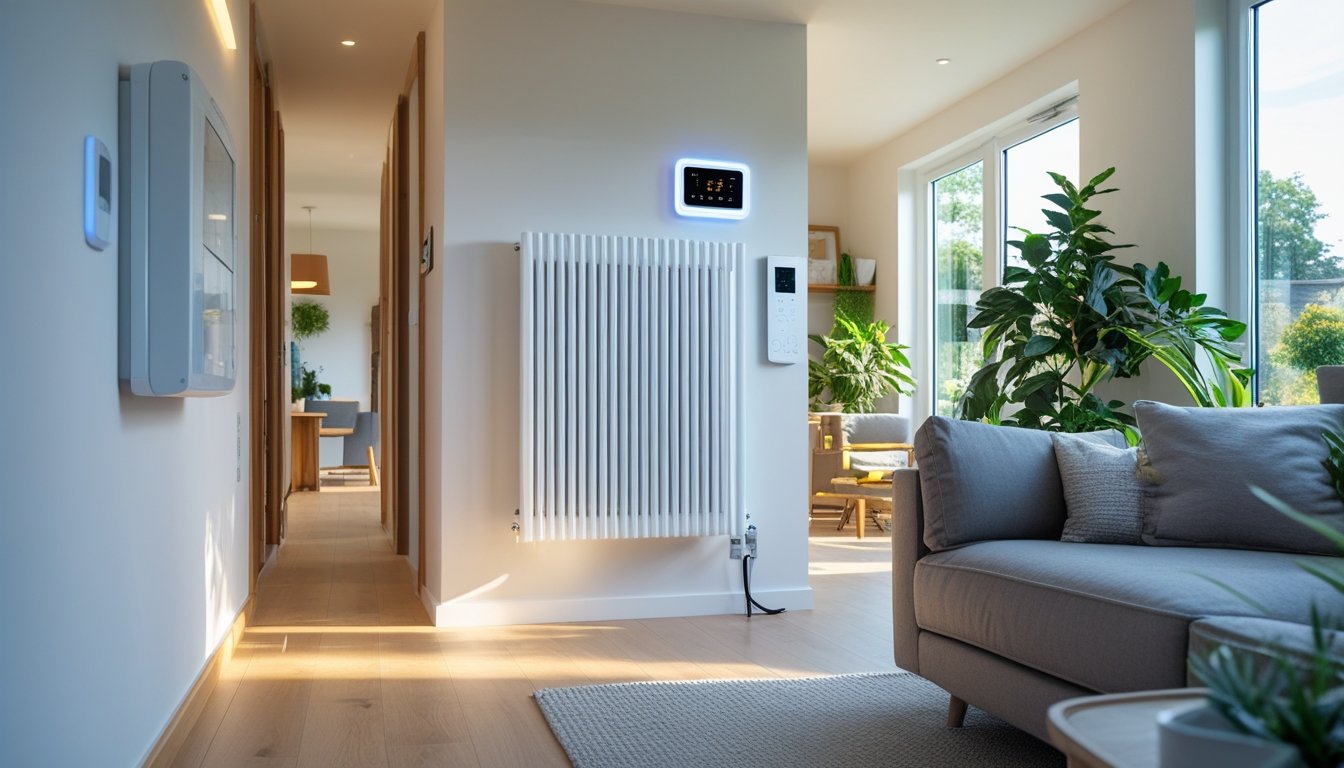Late updated: 04 Oct 2025 14:10
Written by: Eleanor Hartman
The Future Of Electric Heating In British Homes: Innovations And Trends
Electric heating is rapidly transforming how we heat our homes in Britain, driven by the pressing need to reduce carbon emissions and address climate change. The future of electric heating in British homes is promising, with advances in technology poised to make it both efficient and environmentally friendly. As the shift away from fossil fuel-based systems gathers pace, more households are embracing solutions like electric heat pumps and smart heating systems.

We understand that one of the biggest challenges in this transition is the need for a reliable and affordable system. With the government and innovators supporting electrification through incentives and research, electric heating is becoming a viable solution for many. Pioneering projects and research, like those conducted under the Greater Manchester Innovation Accelerator Programme, showcase the potential of these technologies in providing sustainable warmth.
Our journey towards widespread electric heating adoption is underpinned by innovation, growth in renewable energy sources, and the integration of smart home technology. These developments ensure that electric heating is not only a feasible option but a desirable one, offering us a glimpse into a future where our homes are comfortably warm and aligned with environmental goals.
Key Takeaways
- Electric heating is key to reducing emissions.
- Advances in technology make electric heating viable.
- Government support accelerates the transition to electric systems.
Key Drivers Shaping The Future Of Electric Heating In British Homes
Electric heating solutions are increasingly significant for modernising heating systems in the UK. Our approach to reshaping this sector is influenced by several pivotal factors, driving both technological advancements and policy reforms.
Decarbonisation And Net-Zero Commitments
The UK's commitment to achieving net-zero carbon emissions by 2050 is a powerful motivator for transitioning to electric heating. This push is not merely idealistic; it involves setting practical targets that impact how energy is generated and consumed. With traditional fossil fuels contributing heavily to greenhouse gas emissions, electric heating represents a cleaner alternative that aligns with broader decarbonisation goals. Household electricity is increasingly sourced from renewables like wind and solar, substantially reducing the carbon footprint of heating. As we transform our energy landscape, the role of electric heating becomes essential to meet environmental benchmarks set by the Climate Change Committee.
Transition Away From Gas And Oil Boilers
Eliminating gas and oil boilers forms a cornerstone of the UK's strategy to tackle climate change. These traditional systems are notoriously inefficient and carbon-intensive, contributing to high emissions. In contrast, electric heating systems such as heat pumps offer efficiency and sustainability benefits while tapping into cleaner, renewable energy sources. A notable benefit of the switch is the potential rise in thermal efficiency of homes across the nation. Heat pumps, for example, can deliver more than three units of heat for every unit of electricity consumed, marking a seismic shift in energy use and carbon reduction. The appeal of a future less dependent on fossil fuels places electric heating at the forefront of this transition.
Policy Initiatives And Government Support
Government policy initiatives and financial incentives strongly influence the adoption of electric heating systems. Key efforts like the Boiler Upgrade Scheme provide direct support to homeowners transitioning from traditional boilers to more sustainable solutions. Additionally, the implementation of policies accelerating clean energy projects aims to increase accessibility to efficient electric heating. Policymakers understand that legislative support is essential for meeting our decarbonisation targets. Investment in infrastructure and robust frameworks not only enhances energy security but also lowers entry barriers for electric heating, making it widely feasible for households to adopt new technologies. These efforts underscore the importance of government action in shaping energy futures.
Rising Energy Bills And The Shift Towards Energy Independence
Soaring energy bills are a growing concern for many households, driving the urgent need for more cost-effective heating solutions. The geopolitical tensions and market fluctuations that impact fuel costs have underscored the risks of dependence on non-renewable resources. Electric heating presents an opportunity to mitigate these risks, as it leverages low operational costs and the growing affordability of renewable energy. Electric systems offer significant energy efficiency gains, allowing us to achieve cost savings. As we move towards energy independence, the strategic integration of electric heating can help stabilise energy prices. The adoption of these systems aligns well with both economic incentives and environmental imperatives.
Emerging Technologies And Solutions In Electric Home Heating

In the evolving landscape of British home heating, electric solutions offer promising paths towards greater energy efficiency and lower carbon footprints. Key developments focus on integrating electric heating options like heat pumps and boilers with smart systems and renewable energy sources.
Heat Pumps And Electric Boilers As Core Solutions
Heat pumps utilise ambient air or ground heat to efficiently warm homes. They offer a more sustainable alternative to traditional heating methods. These devices work particularly well in moderate climates and are gaining popularity due to their capacity to cut energy costs significantly. Electric boilers provide another eco-friendly alternative. When paired with a well-insulated home, they offer a steady and reliable source of heat that can lessen dependence on fossil fuels.
Both heat pumps and electric boilers contribute to the reduction of carbon emissions. Our commitment to adopting these technologies aligns with the broader goals of achieving increased energy efficiency. As technology advances, these systems are continually improving, becoming more reliable and cost-effective.
Smart Heating Systems And Energy Efficiency
Smart heating systems are transforming the way we manage home environments. By using AI-driven technology, these systems maximise energy efficiency, offering both convenience and savings. Smart thermostats intelligently adapt to our daily routines, learning our preferences and automatically adjusting the temperature to enhance comfort and cut energy consumption. This adaptability helps in reducing wasted heat and lowering utility bills.
Incorporating intelligent heating zones, these systems allow us to heat only the necessary areas at any given time. This targeted approach not only conserves energy but also promotes a sustainable lifestyle. The integration of mobile apps provides us with control over home heating, even when we’re on the move.
Integration With Renewable Energy Sources
Linking electric heating systems with renewable energy sources like solar or wind power offers vast potential. This integration not only supports a clean energy transition but also enables greater energy independence. By pairing heating systems with renewable sources, we can further reduce our carbon footprint while securing a reliable and efficient energy supply.
Electric heating technologies benefit from renewable grids through smart grid compatibility, ensuring minimal energy loss during electricity-heat conversion. As we continue exploring synergies between electric heating and renewable sources, the potential for innovative solutions becomes increasingly viable. This synergy aids in achieving long-term sustainability goals for British households.
Frequently Asked Questions

In addressing the future of electric heating in British homes, several points arise. We explore incentives for installation, compare efficiency against traditional systems, and consider the role of technology and regulations.
What incentives are available to UK homeowners for installing electric heating systems?
Various schemes are available to encourage the adoption of electric heating. The UK government supports initiatives that reduce carbon emissions. Programs like the Boiler Upgrade Scheme may provide financial assistance or grants to homeowners, making it more feasible to transition to electric systems.
How do electric heating solutions compare in efficiency to traditional gas boilers in the UK?
Electric heating systems often boast higher efficiency rates compared to traditional gas boilers. Electricity is converted to heat with minimal wastage, which contrasts with the heat loss typically associated with gas boilers. However, energy costs need consideration as they might vary between electric and gas options.
What advancements in technology are expected to improve electric heating systems in the near future?
Technological advancements are poised to enhance electric heating systems significantly. Smart controls, improved insulation materials, and heat pump integration are among innovations. These advancements aim to improve efficiency and user control while reducing environmental impact, aligning with broader sustainability goals.
How do UK building regulations influence the adoption of electric heating systems in new homes?
Building regulations in the UK play a pivotal role in the adoption of electric heating. The Future Homes Standard, for instance, mandates significant reductions in carbon emissions for new builds. This encourages the inclusion of electric heating systems in new homes, promoting low-carbon living.
What role does renewable energy play in the sustainability of electric heating in the UK?
Renewable energy sources are crucial in ensuring electric heating systems are sustainable. Solar, wind, and other renewable energies help reduce the carbon footprint of electricity used for heating. As the UK continues to expand its renewable energy infrastructure, electric heating becomes a more sustainable choice.
Can electric heating systems meet the high demands of British winters effectively?
Electric heating systems can effectively meet the demands of harsh British winters. Modern technologies, such as advanced heat pumps, ensure sufficient warmth even during cold spells. While initial setup might require investment in appropriate equipment, the result can be a cosy, warm home throughout winter.